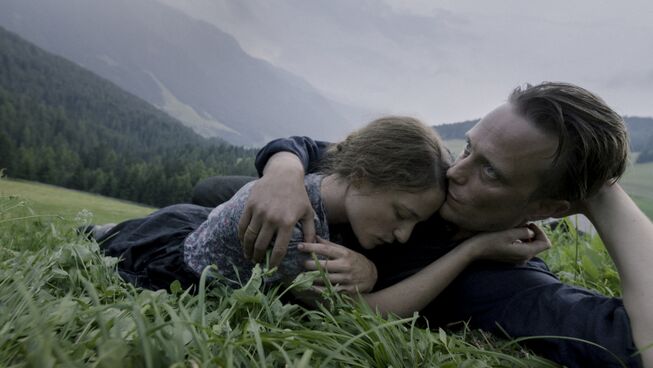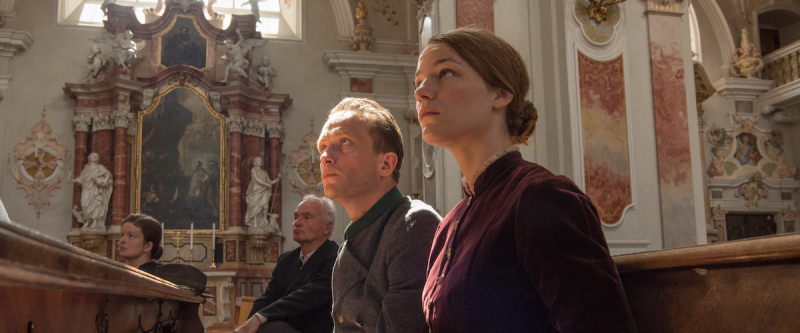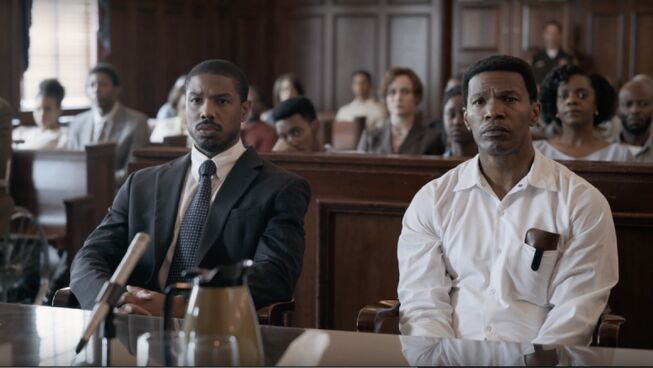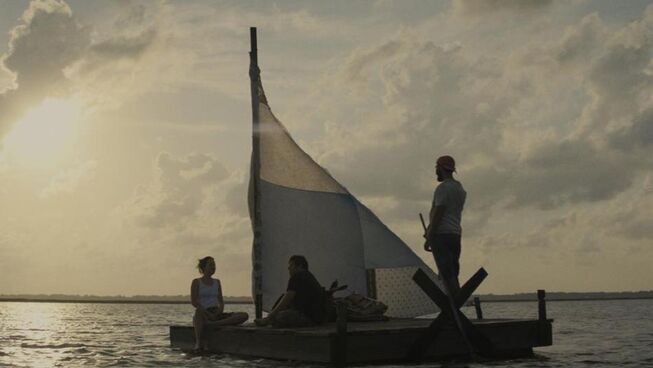
4 out of 5 stars
In the world of cinema, there are few names like Terrence Malick to cause feelings of impassioned enthusiasm and utter confusion. A groundbreaking writer/director known for The Thin Red Line and The Tree of Life who would be classified as a visionary to many while entirely inaccessible to the majority of the world’s cinematic population. A filmmaker who comes out with a project every two or three years that delves into subject matters like the human condition and faith encased in a beautiful visual interpretation of this world. A Hidden Life is a true story that affords Malick all of the necessary components to show his mastery of visual storytelling of the best and worst of humanity.
The village of St. Radegund is a quiet community of farmers nestled in the beautiful mountains of Austria. Franz (August Diehl) and Franziska (Valerie Pachner) Jägerstätter live a picturesque rural life with their three daughters, his mother and Fani’s sister, Resie (Maria Simon). This couple represents the ideal marriage and family life of a healthy farm life. Until the impact of World War II and Hitler’s Third Reich reach over the mountains into their little township. Initially, Franz is merely called up to participate in the army’s basic training, but is allowed to return to his family and continue to support the war effort through their farm.
As the war continues on and the Austrian army is dragged into the Nazi’s military machine, the men of St. Radegund expect to be called for service at any time. This includes swearing an oath to the allegiance of Adolf Hitler and the Third Reich, which becomes a step too far for Franz. He refrains from supporting the German army financially and eventually resists serving the Fuhrer in his war effort. This leads to his family being ostracised by the people of the small community. Even more frightening than the rejection of his friends and family, the most significant concern will be his eventual arrest and potential death sentence for this moral stand against Hitler. His resistance leads him to be thrown into a series of prisons until his trial would take place to determine his fate. During his incarceration, Franziska must maintain the family farm and endure the rejection of those she had called friends for years.
What is evident throughout the 174 minutes is that Malick desires to capture every emotional and visual element of the Jägerstätter’s journey through this heartbreaking season of their lives. The majority of the film is told through their correspondence during this time of the lives. These letters provide a beautiful depiction of their marriage and the love for their family along with the relationships expressed on the screen. The celebrated director exposes the beauty of their love, the majestic elements of the landscapes that surround the little enclave and the tragic impact of their moral decisions to take a stand against evil. It shows how their Christian faith drove their convictions and helped them to endure the persecution and brutal treatment inside prison and out amongst the people.
Diehl and Pachner’s performances capture the relational ties of what drives their passions for one another, their extended family and their perseverance through the difficulties of this story. Their words are complemented by the beautiful lands surrounding their farm, the Inn River's tranquillity and the physicality of the actors . This was a fascinating way to tell a tale that contains little dialogue, but the message of the film comes through clearly though this brilliant combination of filmmaking.
The only knock against this potential masterwork is the director’s inability to ruthlessly edit his own work. The message of faith, family and sacrifice is made inaccessible to audiences because of the unnecessary length. The simple complexity of this biographical journey could have been cut down to allow people to engage with this film. A Hidden Life should be on the ‘must-see’ lists of everyone attending the theatre this year. Still, the length will have this relegated to art-house cinemas and film festivals. Once again giving a win to the streaming services, the modern-day location audiences use to discover films of this quality.
For all of those who can get past the movie's run time, you will be rewarded for your perseverance. Terrence Malick has put together one of his best films in years. One that should be considered for anyone that enjoys excellent cinema, rich storylines and unabashed and fearless depictions of faith in film.
 Reel Dialogue: Crushed, but rich
Reel Dialogue: Crushed, but rich
Franz Jägerstätter’s story came to mind while studying the second chapter of Revelation, specifically the church of Smyrna. A city on the Aegean coast and is in modern-day Turkey today. Interestingly the word smyrna comes from myrrh - a spice that you may be familiar with when you sing of the wise men during the Christmas season. Myrrh is used in burial rituals and is beautiful to smell, but the scent is only released when it is crushed.
In the study of Revelation, you can read that Smyrna is the persecuted church, living in affliction and poverty. Which seems to be the opposite of what most people think is the depiction of the Christian life. But the reality of this church was that it was being crushed, but this pounding led to the release of a wonderful blessing.
During these times of hardship and persecution, Jesus reveals himself in verse eight as the First and the Last. The saviour who was crushed and came back to life. In defeating death he can say to the downtrodden church that, “I know your afflictions and your poverty—yet you are rich!” (2:9).
Like the Jägerstätter’s experience, the powers of this world can take your job, they can take your house, they can even take your life - but they cannot take your true riches. And Jesus tells them, “You are rich!”
“Do not be afraid of what you are about to suffer. I tell you, the devil will put some of you in prison to test you, and you will suffer persecution for ten days” - Revelation 2:10






